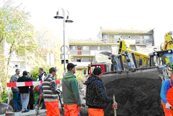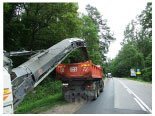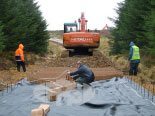Neoloy® Geocells Help Achieve Green & Sustainable Goals
Neoloy Geocells are an ideal sustainable road development and solution in South Africa. They use local or recycled materials, reduces use of virgin resources
Neoloy Geocells are an ideal sustainable road development solution. Neoloy uses local or recycled materials, reduces use of virgin resources, lowers carbon footprint, is more durable and lowers costs. In transportation and infrastructure, Neoloy can lower maintenance budgets while Neoloy Geocells in slope, channel and retention applications achieve multiple environmental goals at a lower cost.
Neoloy is non-soluble, non-hazardous, non-flammable, non-corrosive, non-toxic, environmentally safe and user friendly.
Sustainable Roads
Neoloy is an ideal sustainable road construction technique, offering high engineering value at low environmental and economic costs. |
|
|
Benefits
- Utilize recycled asphalt (RAP) and concrete and other non-cohesive granular fill, such as sand
- High dimensional stability under dynamic loading and thermal cycling
- Very high resistance to environmental conditions, oxidation and UV degradation over time.
- Lower infill qualities and quantities
- Reduce the use of virgin materials and quarrying.
- Reduce haulage and earthmoving equipment
- Decrease fuel use, pollution and the carbon footprint
- Minimize on-site disruption from dust, erosion and runoff.
- Meets sustainable goals of using local, native or recycled materials for infill
- Enhance revegetation, natural landscapes and green walls.
- Advanced water management technique by maximizing infiltration in structural layers
- Reduces runoff and flooding, and increases filter of pollutants by the soil.
- Extend service life and reduce repairs
- Lower operational and maintenance costs, as well as total life-cycle costs (Total Cost of Ownership).
- All-weather roads in rural areas of developing regions increase farmers’ ability to get goods to market
- Simple installation lets local work crews receive on-site training and work on project

 Neoloy confinement improves the performance of RAP and other recycled materials, while utilizing less bitumen and less aggregate.
Neoloy confinement improves the performance of RAP and other recycled materials, while utilizing less bitumen and less aggregate. In landscape architecture, transportation & civil engineering Neoloy Geocells achieve environmental objectives at a lower cost.
In landscape architecture, transportation & civil engineering Neoloy Geocells achieve environmental objectives at a lower cost.